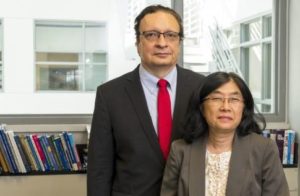
Depression researchers Professor Ma-Li Wong and Professor Julio Licinio, based at Upstate Medical University in New York, have been awarded $A5.2 million ($US3.6 million) from the America’s National Institute of Mental Health to expand their investigations into a key trigger of this condition in the brain.
These two Flinders University academics, along with South Australian colleagues including Flinders University Head of Psychiatry Professor Malcolm Battersby, recently published new findings on how a plant gene that guides plant root growth (PHF21B) and the protein it encodes regulates social behaviour, synaptic proteins and long-term potentiation in mammalian brains – all involved in memory and regulated by stress.
Based on their first discovery in 2016, the new paper published in JCI Neuroscience investigates how animals deficient in this gene treat other animals like new each time they meet. The researchers found that knocking down the PHF21B gene impacts social memory.
“We tried to show that this gene continues to be important throughout life,” says Professor Licinio, who is also associated with the SA Health and Medical Research Institute Mind and Brain Theme.

“One of the potential implications is for disorders like autism or some psychiatric disorders where social recognition memory is affected.
“What’s really exciting about this is the innovation and that we are pursuing a new pathway that goes way beyond what people have been looking at (for optimal treatments).”
Strategic Professor Wong says the grant project aims to explore the mechanism by which this gene disrupts social memory.
“This gene has not been implicated in brain dysfunction before,” she says. “Some brain circuitries and specific brain areas are disrupted when this gene is deficient, so we are going to focus on those areas and try to understand the precise mechanisms by which social memory is impaired.”
Read more at State University of New York (SUNY) Upstate Medical University News.

